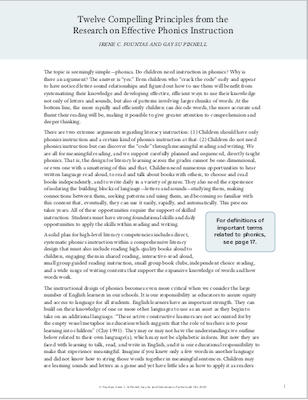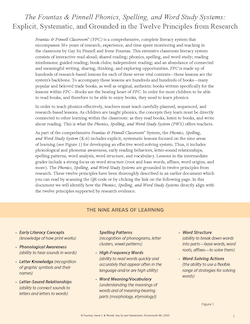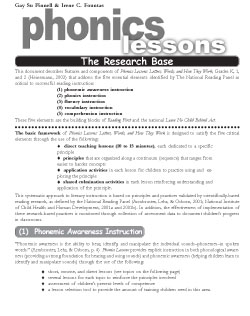Phonics, Spelling, and Word Study Systems Research
Irene C. Fountas and Gay Su Pinnell are committed to the important role of research on reading in the ongoing development and evaluation of Fountas & Pinnell Phonics, Spelling, and Word Study Systems (PWS). Find the latest research on PWS below.
Research Base: Phonics, Spelling and Word Study Systems (K-6)
Twelve Compelling Principles from the Research on Effective Phonics InstructionIn this document we will explore the important findings—twelve compelling principles—from a large body of research. These principles rest on decades of research on literacy instruction and how literacy and language develop in children over time, as well as on more than thirty years of our own extensive experience in classrooms across the country. A high-quality phonics design is based on what we know about how children learn to read, and it continuously expands their knowledge about words and how they work. (An essential foundation for the implementation of such a design is the teacher’s understanding of the content to be taught—the complexity and structure of language.)
Read the research behind effective phonics here »
Twelve Compelling Principles from the Research on Effective Phonics Instruction

Read part two, "The Fountas & Pinnell Phonics, Spelling, and Word Study Systems: Explicit, Systematic, and Grounded in the Twelve Principles from Research," a document that demonstrates the direct alignment to this body of research.
The Phonics, Spelling, and Word Study Systems are grounded in twelve principles from research. In this document we will identify how the Phonics, Spelling, and Word Study Systems directly align to the twelve principles supported by research evidence.
Read how PWS is directly aligned to the research here »
The Fountas & Pinnell Phonics, Spelling, and Word Study Systems: Explicit, Systematic, and Grounded in the Twelve Principles from Research

Part two in a two-part research series, Irene C. Fountas and Gay Su Pinnell align the Phonics, Spelling, and Word Study Systems (K-6) to the research on effective phonics instruction.
Make sure to read part one in this research series, "Twelve Compelling Principles from the Research on Effective Phonics Instruction."
Phonics Lessons© 2003
Phonics Lessons are grounded in a wide base of academic research, including all the areas examined by The National Reading Panel, and reflect its recommendations for phonemic awareness, phonics, fluency, vocabulary, and comprehension. In addition, the lessons reflect practical, classroom-based research in how children learn, practices that have been reconfirmed by many teachers as they have field-tested Phonics Lessons and Word Study.
Review the former edition of Phonics Lessons: The Research Base »
Phonics Lessons Research Base

This document describes features and components of Phonics Lessons: Letters, Words, and How They Work, Grades K, 1, and 2 that address the five essential elements identified by The National Reading Panel as critical to successful reading instruction:
(1) phonemic awareness instruction
(2) phonics instruction
(3) fluency instruction
(4) vocabulary instruction
(5) comprehension instruction
These five elements are the building blocks of Reading First and the national Leave No Child Behind Act.



